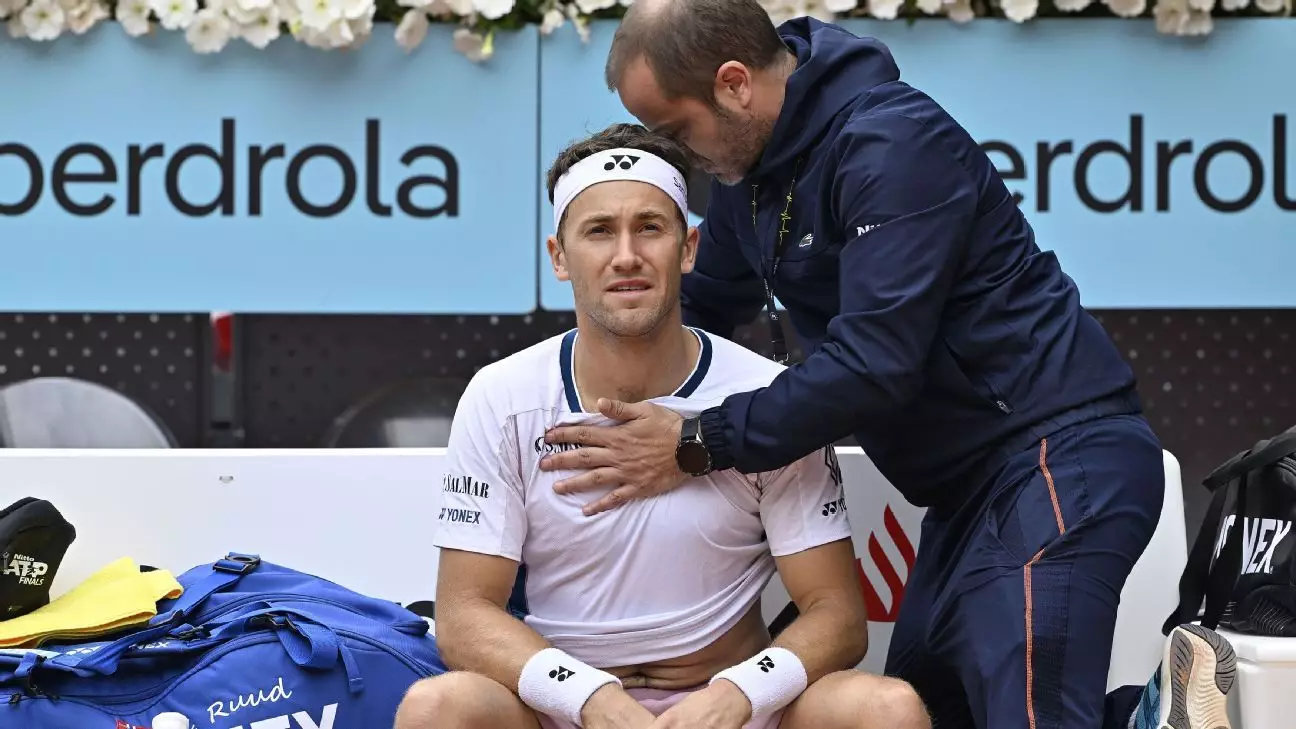In the high-stakes world of professional tennis, the mental and physical fortitude of athletes is continuously tested. Recent events at the Madrid Open vividly illustrated this point, showcasing Norwegian star Casper Ruud’s remarkable perseverance against physical adversity. Ruud, fighting through significant rib pain, delivered a compelling performance to defeat Francisco Cerundolo in straight sets. The victory not only secured his place in the final but also underscored his relentless spirit—a trait that defines the most successful athletes.
Faced with the daunting reality of an injury that threatened to derail his campaign, Ruud’s ability to refocus and push through the discomfort highlighted his determination. After receiving treatment just three games into the match, he battled not only the Argentine player but also the nagging pain that accompanied each serve. His honesty post-match, admitting he almost doubted his ability to complete the contest, reminds us of the human side of these athletes—even those who have reached the sport’s highest echelons.
The Numbers Behind the Victory
In analyzing Ruud’s performance, statistical insights reveal a player operating at an astonishing level under pressure. Saving 15 out of 18 break points against Cerundolo speaks volumes about his defensive capabilities and mental resilience. This statistic also reflects the shifts in momentum that can occur in tennis matches, especially in high-stakes settings like the Caja Mágica center court. Ruud’s victory, with set scores of 6-4 and 7-5, reflects a player who can navigate challenges while maintaining composure—traits essential for anyone aspiring to reach the pinnacle of competitive sports.
Moreover, it’s significant to note that the Norwegian is now poised to ascend back into the top ten rankings, with a win in the final potentially securing him the coveted sixth place. The prospect of becoming the first Norwegian to capture an ATP 1000 title adds another layer of pressure, yet it also serves as motivation. The narrative of Ruud’s journey from an aspiring player to a top contender resonates deeply within the tennis community and offers a real-time testament to the rewards of perseverance.
Jack Draper: A Rising Star
On the opposite side of the draw, young English talent Jack Draper was creating his own tale of resilience by reaching the final against Ruud. With a dominant victory over Lorenzo Musetti and two sets won—6-3 and 7-6(4)—Draper showcased not only his physical prowess but also his tactical acumen against a similarly skilled opponent. This match marked Draper’s impressive streak of not dropping a set throughout the tournament, solidifying his status as a formidable competitor on the ATP circuit.
Draper’s articulate reflection on the match emphasizes the respect athletes have for one another, even amidst relentless competition. Recognizing Musetti’s growth as a clay-court player, Draper’s words reflect a maturity that is often lacking in younger athletes. This acknowledges the emotional and tactical intricacies involved in tennis, particularly when facing opponents with whom one has a shared history, as Draper does with Musetti.
The Role of Family and Superstition
Beyond the physical and tactical aspects, Draper’s remarks about family support add a compelling dimension to his narrative. Discussing his mother’s presence during the matches, he humorously shifted from expressing concern over potential jinxing to acknowledging the extra luck she brought with her presence. Family dynamics often play a pivotal role in sports, providing emotional grounding for athletes who face immense pressures. This touch of levity in high-pressure situations reflects the complex psyche of competitors as they strive for excellence.
This playful nuance emphasizes the personal connections that underpin high-performance sports, a reminder that behind every professional competitor are deeper stories of relationships, emotions, and the drive to succeed not just for themselves, but also for their families.
In sum, the Madrid Open exemplified tennis as more than a mere sport; it is a compelling theater of resilience, strategy, relationships, and individual growth. Ruud and Draper both contribute to this narrative, reflecting the rich tapestry of human experience that unfolds on the courts. Their journeys remind us why we watch and support these athletes, bringing forward stories of not just their triumphs— but their struggles, making the victories all the more meaningful.

